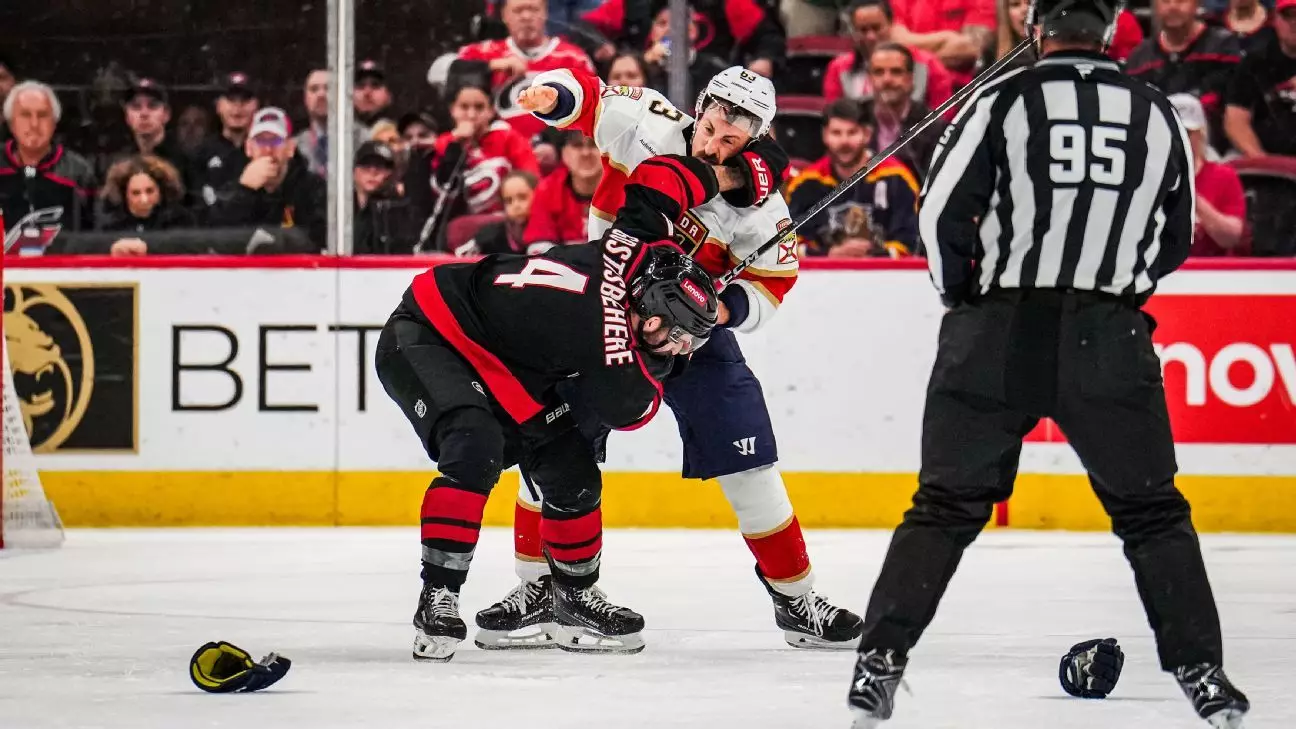The thrill of playoff hockey is undeniable, but as the stakes rise in the Eastern Conference finals, so does the pressure on teams to maintain composure. Carolina Hurricanes coach Rod Brind’Amour has underscored the need for mental fortitude against an opponent like the Florida Panthers, who are notorious for their physical and disruptive playing style. With the series starting off poorly for Carolina after a 5-2 defeat in Game 1, the urgency to think strategically rather than emotionally becomes imperative.
In high-tension games like these, the balance between aggression and restraint is delicate. The Panthers thrive on provoking their rivals, and falling into their trap can lead to disastrous consequences. Brind’Amour’s call for his players to adopt a smarter game plan reflects the understanding that emotional responses can tilt the game in favor of the opposition. The Hurricanes must remember that while passion fuels performance, unchecked emotion can unravel their strategy.
The Cost of Mistakes
During the opening game, it was evident that emotions were running high when Carolina’s Sebastian Aho fell into the retaliatory trap. His roughing penalty against Anton Lundell not only negated a power play chance for the Hurricanes but directly contributed to Florida scoring their first goal on the ensuing man advantage. This sequence highlights how a single emotional outburst could send ripples through the entire game. Brind’Amour articulated the sentiment that such retaliatory actions, however understandable, can be detrimental.
The Hurricanes have displayed resilience through this playoff series, posting an impressive 5-0 record when scoring first. However, once behind, their performance seems to falter, as evidenced by their 3-3 record when conceding the opening goal. This trend emphasizes the dire need for the Hurricanes to approach the game with a mental strategy that circumvents unnecessary penalties and focuses on maintaining advantage.
Punishing Mistakes Under Pressure
Florida’s success in capitalizing on Carolina’s mistakes, as highlighted by the Hurricanes’ previously strong penalty kill statistics, paints a clear picture of the consequences that come with lapses in discipline. The Panthers’ ability to take what’s given—evidenced by their 2-for-3 efficiency on power plays in Game 1—reinforces the reality that playoff hockey is as much about executing strategy as it is about executing physical dominance.
Carolina captain Jordan Staal’s recognition of the need to limit mistakes also mirrors the team’s overarching goal of reining in their game, particularly against a skilled opponent like Florida. Winning the battle of discipline may ultimately be the decisive factor in future games, not just for the Hurricanes but in any playoff matchup.
The Tactical Edge of Composure
Florida’s reputation as a tough opponent speaks volumes about their ability to handle physicality while maintaining their composure. Panthers’ goalie Sergei Bobrovsky exemplified this composure in Game 1, effectively managing to keep his cool despite aggressive attempts to rattle him. Bobrovsky’s poise under pressure, reinforced by his coach Paul Maurice’s confidence in him, serves as an essential element to Florida’s road to victory. It’s a stark contrast to the Hurricanes’ emotional reactions, highlighting the importance of steadying oneself in the face of tactical provocations.
It’s crucial for the Hurricanes to recognize that while physical play is part of the playoff ethos, the ultimate victor will likely be dictated by those who can harness their energies in a productive manner. With tensions often running high, maintaining a level-headed outlook separates victors from those who succumb to needless penalties and emotionally charged accidents.
Looking Ahead to Game 2
As Carolina gears up for Game 2, the necessity of recalibrating their approach is at the forefront of Brind’Amour’s strategy. Emotion is an essential component of playoff success, yet the challenge lies in keeping that passion in service of a clear tactical goal. With a history of struggles—having lost 13 consecutive games in this round of the playoffs—the target on their back only grows larger.
If the Hurricanes want to shift the momentum back in their favor, they must effectively counter Florida’s tactics while finding a way to channel their emotions constructively on the ice. The coming game will reveal not just their technical prowess, but their psychological resolve—the true litmus test of a playoff contender. With the series finely poised, the requirement for strategic discipline has never been more pronounced for Carolina. Each moment counts, and how they respond could very well determine their fate in this critical playoff chapter.

